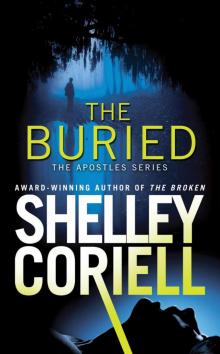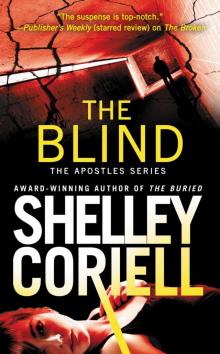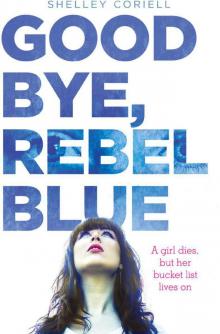- Home
- Shelley Coriell
Goodbye, Rebel Blue Page 2
Goodbye, Rebel Blue Read online
Page 2
“Hey, it looks like you got into it, too.” Kennedy stands over my desk, grinning. “Wasn’t this whole bucket-list thing fun?”
I squint at my notebook and blink. The page is full of words.
“It’s five o’clock, and Ms. Lungren isn’t back,” Kennedy says. “I wonder what happened to Macey. She looked upset.” She tugs at the end of her ponytail. “We should probably help her. You know, find her and let her know detention isn’t the end of the world, that this whole bucket-list thing was fun.”
I study the words bleeding across the page, words supposedly mined from the deepest part of my heart. A sharp, unexpected ache fills my chest.
“What are we supposed to do with our lists? We can leave them on the desk for Ms. Lungren.” Kennedy taps her chin with her pen. “But she told us to keep them. Maybe we should make copies. Then we can take the notebooks with us.”
My finger slides over the final two lines, little more than faint scratches. The page blurs.
A hand lands on my arm. “Rebel, did you hear me? Maybe we should make copies.”
I tear the list from the notebook and wad it into a ball. Tighter. Smaller. Impossible to read. I lob the paper into the trash. This assignment, the entire idea of digging deep into my heart, is a waste of my life. “Maybe we shouldn’t.”
Kennedy’s mouth puckers in surprise, and a second later a tiny grin sneaks onto her lips. “Yeah, maybe we shouldn’t.” She casts a nervous glance at the doorway and then tosses her list into the trash.
I sling my messenger bag across my chest and rush out of the detention room. Away from Kennedy. Away from that list.
Kennedy follows, her ponytail no longer bobbing but bouncing. “I think you’re an interesting person. And fun.”
The gate at Unit Eight is locked. I race-walk down the breezeway and try the gate near Unit Four. Also locked.
“Maybe we can go out for chai tea sometime and talk. People say I’m easy to talk to.”
I try the gate near the gym. No go.
“Or smoothies. Would you like to go out for smoothies?”
“I’d rather drink a cup of kitty.” I mentally blot out annoying inspirational posters of kitties in teacups and sprint through the quad, the ache in my chest growing. Stupid cigarettes. Finally I reach the main gate and freedom, but I don’t celebrate. Aunt Evelyn is going to explode when she hears about detention, a blowup of nuclear proportions.
Kennedy pops up beside me and rests her hand on my shoulder. “You don’t look well. Do you need something?”
I slide my fingers along my messenger bag, the shark teeth strung across the strap making a comforting tinkle. “I need a bomb shelter.”
AFTER DETENTION, I WALK INTO THE HOUSE AND toss my messenger bag at one of the brass hooks near the kitchen door. The bag slams into the wall and crashes to the floor. I wait for the shriek, Rebecca, pick that up!
But the house is silent.
Strange, because Aunt Evelyn lives by the motto A place for everything, and everything in its place. She’s a residential stager, which is a type of interior designer. Before people put their houses up for sale, they hire the Aunt Evelyns of this world to redecorate, rearrange, and revitalize their homes in order to lure in the highest, fastest bids. Our home, a two-bedroom, Craftsman-style bungalow, is her picture-perfect portfolio.
I grab an apple from the ceramic rooster on the kitchen table and head down the hall to the bedroom I share with Penelope. Cousin Pen sits at the desk on her side of the room. She’s thumbing through her calc book and humming. People who hum while doing math are perverted.
Penelope is the type who gets math. And cupcakes. On her fifteenth birthday last year, Penelope received cupcakes from her “bestest” buds, all seventeen of them. Since we share a bedroom, I lived with crumbs and the disgusting smell of buttercream frosting for a week. At the beginning of week two, I tossed the remaining cupcakes over the back fence for Tiberius, the next-door neighbor’s rat terrier who has a sweet tooth and serious dental issues.
I kick off my flip-flops, and they soar across my side of the room, where they crash into a pile of laundry. “Where’s your mom?” I ask Pen.
“At school.” Hummmmm. “She’s meeting with the dean of students and your math teacher.”
I dig through the rumpled sheets on my bed and find my sketchbook. “Now there’s a double shot of happy.”
“Not for you.” Her humming sounds like a chain saw.
I tuck the sketchbook under my arm and bring the apple to my mouth but don’t bite. “Say it.”
“Say what?”
“Something that will no doubt bring me great pain and misery.”
Pen looks up from her calculus. “Mom’s really pissed. Because of detention this afternoon, you missed the math tutoring session she scheduled with Mr. Hogan.”
“Bummer. I so love math.” I take a bite of apple and, before she starts humming again, escape down the hall.
At the back of the Craftsman-style bungalow there’s a tiny laundry room, and in the ceiling is a drop-down door. Uncle Bob calls the room above this door the attic crawl space. Aunt Evelyn calls it a storage area. I call it heaven.
I reach for the frosted piece of amber sea glass hanging from a string on the door, when the staccato clip of high-heeled shoes sounds behind me, followed by the sharp words, “Give me your scooter key. Now!”
Aunt Evelyn stands in the laundry room doorway. A single vein thickens and reddens in her neck.
The tumbled glass digs deeper into my palm. “Why do you need my key?”
“While you were in detention, I talked with school administrators and a few of your teachers, and things don’t look good. You’re a smart girl, Rebecca, and capable of doing A work. Look at your grades in AP English. Your abysmal grades in math and biology clearly show you’re not studying enough, so I’m taking away your scooter for the rest of the week. No scooter means no long after-school bike rides, so you’ll have more time to study.”
I slap my palm on my forehead. “Oh, I get it now. It makes so much sense. Would you also like my right kidney and first-born?”
“Rebecca, stop being a smart-ass!” A hissing spray of spit shoots from my aunt’s lips, iced with coral lipstick that perfectly matches her pumps and sweater set.
“Would you like me to be a dumb-ass?”
Aunt Evelyn’s lips pinch so hard, the lipstick rises in snaky ridges. I’m failing math, but I’m extraordinarily good at pushing buttons. She slicks her tongue over her lips and smooths the ridges. “All I want, Rebecca, is for you to study more.”
I steady my hand on a giant rack of cleaning products. Across the rack is a string of paper cranes Cousin Pen made last year in support of nuclear disarmament. “Grounding me for the rest of the school year and locking me in a room with only my algebra book for company won’t help. I don’t get Algebra II. I already talked to my math teacher. The goal is to get through class this year with a D, and right now, that’s doable.”
“Ds are unacceptable in this household. You need to study more. Penelope studies four hours a day and gets straight As.”
But I don’t live on the same planet as practically perfect Cousin Penelope. We don’t even breathe the same air. “Study? You want to talk about studying? Fine. I studied all week for that math test, including three hours the night before. I spent my entire lunch hour going over the test review sheet. I tried. Do you hear me? I. Tried.”
“Try harder.”
“You don’t get it, do you?”
“Get what?”
“The rules. I don’t get the stupid rules!” I bang a fist on the cleaning rack. Paper cranes sway, and a bottle of cleanser crashes to the ground. Blue liquid leaks onto the floor. The humming down the hall stops.
Even here in the laundry room, my head spins with the jumble and tumble of all those math-y rules. One of my tutors in junior high explained that math is a series of building blocks with clear and constant rules that determine the placement of those blocks.
My problem: a faulty foundation. My mom homeschooled me until age ten, and she wasn’t big on math. Or rules. Until I moved to Tierra del Rey, I did most of my studies curled up in the back of our ancient Jeep as we puttered across the Americas while Mom shot photographs. I studied history at Mayan ruins and biology in the Amazon rain forest. My English texts were dog-eared classics Mom dug up at used bookstores. And art, the study of light and color and shapes, was everywhere. All this left little time for math.
Aunt Evelyn picks up the bottle of cleanser. “Which is why you need to study more and attend the tutoring sessions I set up.” She grabs a towel and wipes up the puddle of blue before setting her lips in a pinched smile. “I’ll also get Penelope to review your homework and your teacher to send weekly updates and …”
She continues, but I block her out. Just like with math, I tried. I tried to reason with my aunt, but you can’t communicate with a person who doesn’t speak the same language. I’ll have to wait for Uncle Bob to get home. Uncle Bob is my mom’s older brother. He’s an accountant, a math guy, and while he doesn’t always understand me, he isn’t always trying to change me into something I’m not and never want to be.
When Aunt Evelyn finally stops lecturing, I pull the amber sea glass, and a door with a ladder unfolds. Once upstairs, I throw open the dormer windows. Lances of sunlight stream across the attic and strike the jars of sea glass crowded onto shelves on the back wall, sending colorful bits of light tumbling like confetti through the room. Slivers of amber and yellow, wedges of blue, and dots of green dance on the attic walls. If I believed in Kennedy Green’s “heaven,” it would be the color of confetti light.
I sink onto my chair and plug in my soldering iron. I run my fingertips along the wooden picture frame I whitewashed yesterday and a jar of sea glass the color of splintered ice.
I found my first piece of sea glass the week I came to live with Uncle Bob and Aunt Evelyn, the week I buried my mother. I needed to escape all the people patting my hand and telling me my mother was in a better place, so I ran to the beach looking for shark teeth. With Mom I traveled the back roads and beaches of Mexico and Central and South America, where we chased light. Mom was a photographer, and her heaven, if she believed in one, would be full of evocative light.
Together Mom and I collected shark teeth, mostly in our travels around the Gulf of Mexico. In her unique take on a homeschool science lesson, Mom explained that sharks continually shed their teeth, which fall to the ocean floor, where they become fossilized points of shiny ebony, topaz, and pearl. “Jewels of the sea,” Mom called them. For one of my science projects, I strung together a set of shark teeth and presented her with a necklace.
“How unique!” Mom exclaimed. “How extraordinary!”
In the sands of Tierra del Rey, I found no shark teeth, but I discovered frosted bits of glass, each tumbled smooth and dulled by years of sand and salty waves. In that first year after Mom’s death, I collected enough glass to fill six Mason jars.
I dig my fingers into the jar, scooping out a handful of time-softened glass. Time to forget about Aunt Evelyn and Penelope and annoying girls who talk about death and destiny. Time to make something extraordinary.
“Good morning, class. I’d like you to meet Herman, a four-foot black-tipped reef shark in serious need of therapy.” Mr. Phillips aims his pointer at a screen with an image of a one-eyed shark with half a dorsal fin, nine broken teeth, and a scar on his belly shaped like Baja California. I notice these details because I sit at the lab table in the front row, center, a not-so-brilliant idea concocted by Aunt Evelyn and Mr. Phillips during their last parent-teacher love-in. Both figured moving me to the front row would help me stay on task and be less disruptive.
“Looks like ol’ Herman also needs a dentist,” I say.
Mr. Phillips must have had an extra spoonful of sugar on his bran flakes this morning. He points to the screen. “For three years Herman lived in a ten-foot aquarium in the back room of some shady San Diego fish dealer. He spent every hour of every day in that cramped space until animal-rights activists found him a cushy new home in an Olympic pool–size habitat. With all that room to swim, you’d think Herman would be in sharky Shangri-la, but he stayed in a ten-foot space until the day he died.”
“Doesn’t sound like the brightest fish in the tank,” I say, but none of my classmates laugh. They are too busy talking among themselves in hush-hush voices. And today I need a laugh. When Uncle Bob got home last night, a monstrous family battle broke out and ended with Aunt Evelyn slamming doors, Cousin Pen locking me out of our bedroom, and Uncle Bob ultimately allowing me to keep my scooter key.
Mr. Phillips waves his pointer. “Focus, class. We’re starting a new unit on animal behaviors, and we’ll learn more about the Hermans of this world and why they do what they do.”
“I’m trembling with excitement,” I say. I’m only snarky in biology and sometimes Algebra II. Frustration fuels my math outbursts. My war with Mr. Phillips is rooted in all things Penelope. My cousin is a science rock star. I can’t carry a tune.
Mr. Phillips stares at the ceiling. To give detention, or not to give detention: that is the question. In my defense, I’m the only one paying attention to his lecture on Herman the shark. The classroom buzz gets louder. Somewhere in the back of the room, someone sniffles.
At the lab table across from mine, a football type with a short, thick neck nudges another guy of the jockish persuasion. “Did you hear about the accident?”
“Yeah,” Jock Number Two says. He wears a light blue preppy shirt and pressed khakis and has a scrubbed, squeaky-clean look. “Kennedy Green.” He shakes his head, but not a single hair moves. “Wow.”
I spin my pencil between my thumb and forefinger and wonder what’s up with Kennedy What-Color-Is-Your-Heaven Green.
“It’s horrible,” No-Neck Jock says.
“I can’t believe it,” Mr. Squeaky Clean adds. “I can’t believe she’s dead.”
My pencil clatters to the desk. I must have heard wrong. I tap Mr. Squeaky Clean on the shoulder. “You’re not talking about Kennedy Green, are you? The girl with the … uh … blond ponytail?”
“Ms. Blue, you seem uncharacteristically social this morning,” Mr. Phillips says. “Is there something you need to share with the entire class?”
I don’t turn from Mr. Squeaky Clean.
“Were you her friend?” he asks.
You are a moron. “Casual acquaintance.”
“She died last night. Her car slammed through a guardrail at Diego Point and crashed into the sea below.”
The skin at the back of my neck prickles. Less than twenty-four hours ago, Kennedy and I talked about death and gold ladies and heaven. Strange coincidence.
It’s fate.
I snort so loudly, Mr. Phillips taps my desk with his pointer. Mr. Squeaky Clean frowns, and in my head, Kennedy continues to jabber. I passionately believe there’s a higher being or unseen force that places us where we need to be when we need to be there.
I pick up the pencil and spin it some more. Well, Kennedy, you must have pissed off said higher being or unseen force. The pencil clatters to the desk again. More than once Mr. Squeaky Clean glances at me. Not that he’s looking at me in that way. He gives me the look he might give Herman the mentally disturbed shark.
During the rest of class I refrain from smart-ass comments and focus on Herman the shark, on Mr. Phillips’s ugly tie—which today looks like a windshield after a cross-country road trip—on anything but Kennedy Green’s death, which in theory should be easy, as, until yesterday, I’d never spoken to Kennedy Green. For two hours we sat in detention together, a far-from-memorable blink in a lifetime of fluttering eyelashes.
With five minutes left of class, the intercom beeps. “Mr. Phillips, can you please send Rebecca Blue and Nate Bolivar to the office?”
I want to kiss the little speaker box above Mr. Phillips’s desk. Finally, something normal in my world. Mr. Squeaky Clean, who must be Nate, does not
share my joy at being called to the office. He stands, his forehead scrunched. He’s not the delinquent type, like Kennedy Green.
Dead Kennedy Green.
A police officer with a shiny badge and shinier bald head meets Nate and me in a small conference room in the school guidance center. “Good morning, Rebecca, Nate.”
I sit on the edge of the chair nearest the door and wrap my arms across my chest. The cold, hard shark teeth on my messenger bag bite into my bare arm.
The officer pulls out a tablet. “I’m not sure if you heard yet, but one of your classmates, Kennedy Green, died in a car crash last night. We’re investigating, and, as we understand it, you were two of the last people to see her alive.”
My flip-flops shuffle under my chair. Kennedy was right; I’m not the sort who likes talking about death. I’d rather talk about sharks with psych issues.
The officer taps on his tablet. “We need to know Kennedy’s mind-set yesterday afternoon. Was she happy, sad, upset? Did she seem nervous or agitated?”
“Why?” I ask. Keep him talking. That way I don’t have to talk about death. After Mom died, Aunt Evelyn desperately wanted to talk about my feelings. “It’s okay to be sad,” she kept insisting. “It’s normal to cry, Rebecca. You can cry. Why aren’t you crying?”
The officer clears his throat. “The car crash that killed your friend was a single-car incident, and we’re investigating to determine if it was accidental or purposeful.”
I scrape my jaw from the floor. “Suicide? You think Kennedy Green committed suicide? She was the world’s happiest person.” People who plan on decorating the gym for prom next month don’t kill themselves.
“There were no adverse weather conditions, no road hazards, and that portion of the highway is straight,” the officer explains. “We need to determine her state of mind at the time, and you two should be best able to tell us.”
Early in detention, Kennedy sobbed a river of snot and tears and was beating herself up for getting detention, but I calmed her and …

 The Buried (The Apostles)
The Buried (The Apostles) The Blind
The Blind The Broken
The Broken Goodbye, Rebel Blue
Goodbye, Rebel Blue